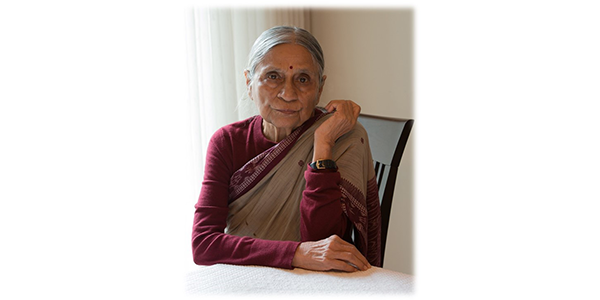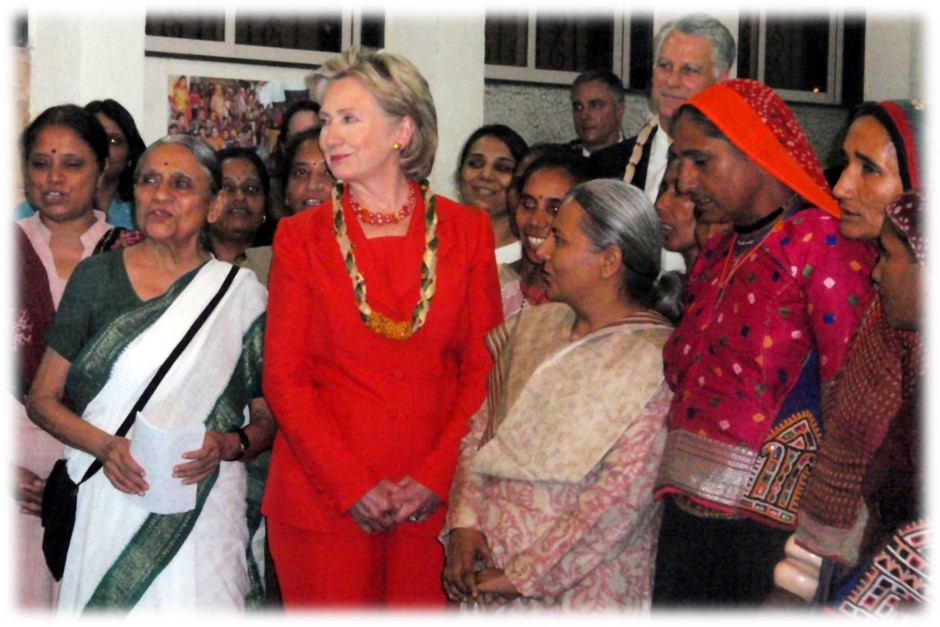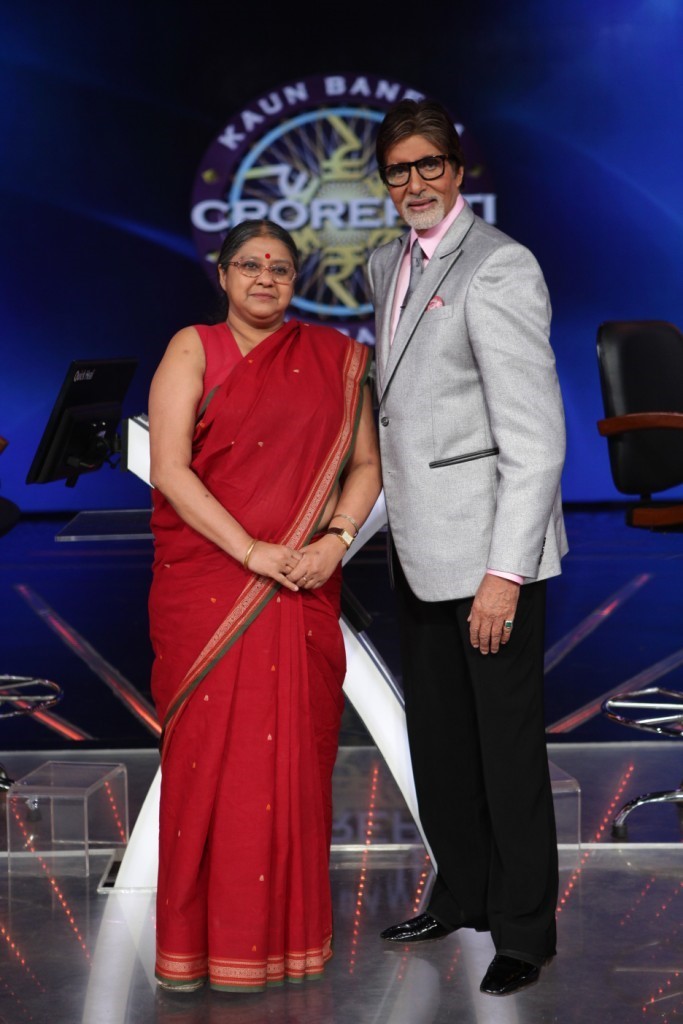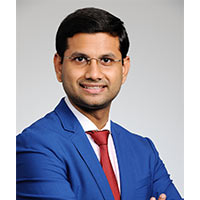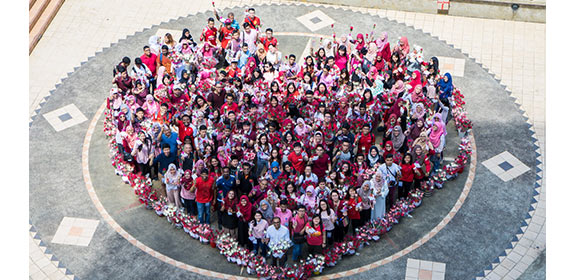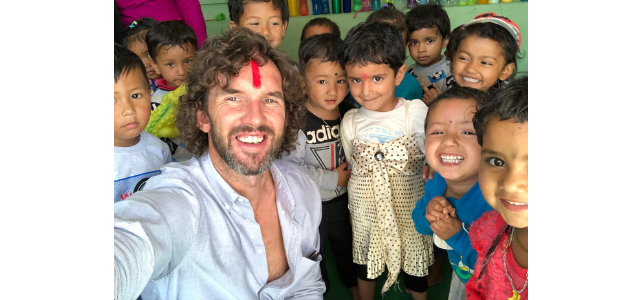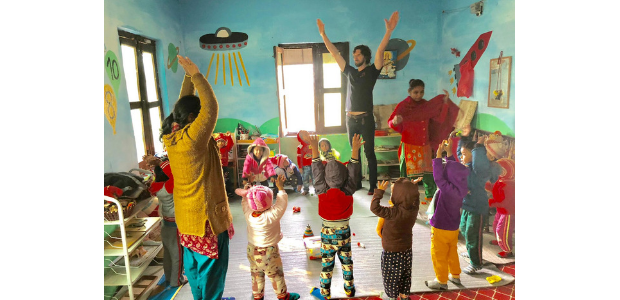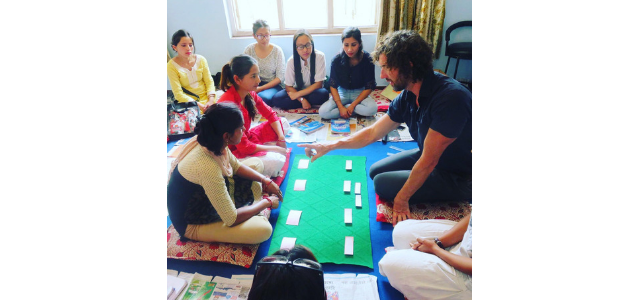Crucible Chronicles: An Interview with Pickbrain and Rashmi Furtado
Just days before the national finals of the biggest campus business quiz of India, Tata Crucible for the Campuses, 2018 and with the excitement brimming over, Knowledge Tribal Vishnu Rao caught up with quizmaster Pickbrain and Rashmi Furtado to get their take one one of the biggest campus quizzing events in India.
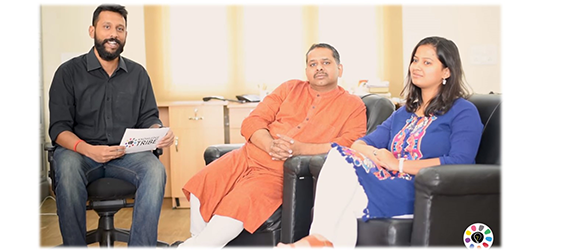
38 cities, not including Dubai and Singapore. The journey started at Chandigarh and concluded in Mumbai. They went all across the country, left right, everywhere. Here’s a quick chat with the duo who carried the massive events on their shoulders.
Vishnu: The campaign map is a little confusing if you look at it, I mean, geography goes out of the window over here, doesn’t it? What’s that like?
Pickbrain: See, there’s a lot that goes into the planning of an event like this. So, on the face of it, while it looks like we are going from one city to another, there are so many entities which have to be taken into account, there is a ground team that sets things up, there is a TV crew which comes in there, so I think in the scheme of the plans that they do in terms of logistics, the last person that they would be concerned about is the quizmaster. I guess that’s really how it falls into place.
Rashmi: Also, about the exams, the convocation, and all of that. Its just that the institutes themselves are busy with a lot of things in between, a lot of events, so we have to plan accordingly, what’s ideal for all of these institutes.
Vishnu: This is pretty much making you guys expert travellers. Is there any mode of transport you all haven’t taken during this Crucible?
Rashmi: A ship, (laughs) I think we haven’t travelled by a ship.
Vishnu: You never know, there is still time for that. No, but there is just so much travel, you guys go from Jammu to Kerala, Kerala to eastern coast, then back to somewhere in the south and all that; doesn’t that take a toll on you guys?
Pickbrain: Not really. It is not something we really consider, or you know or, it doesn’t bother us beyond a point. You got to do it. A lot of people react that way, but through school and college, you keep telling yourself I’m going to do what I love doing. When you get to do what you love doing, you don’t complain and say, ‘I can’t travel everyday’. You can’t become a surgeon and say, ‘the patient fell ill at midnight’. You got to do the surgery at midnight, you love doing it then you do it.
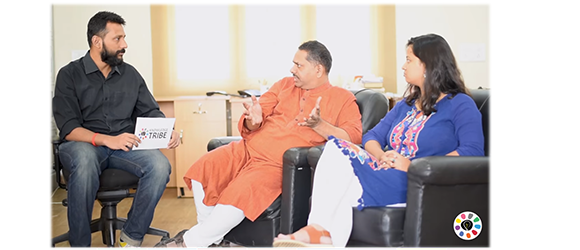
Rashmi: I’d like to add to that. When you’re doing what you love doing, there’s a sort of enjoyment in what you do every day, and it’s not necessarily a job or work anymore; its like a permanent holiday that you take. So, I think, that’s how we function. Maybe not for everyone, but that’s how it works for us. When we go there, when we meet all of these college kids, any quizzers, or any knowledge enthusiast for that matter, we talk to them, and the way they are so passionate about these things, that gives us a lot of energy, so it doesn’t really get that tiring at all.
Vishnu: That’s an interesting point that you raised. You’re going to meet a lot of people from all across the country, right? And several times you hear about the fact that this is… the Crucible is going to small towns like a Trichy or an Anand or something like that. What is the level of participants that you meet over there?
Pickbrain: Cities have become redundant in terms of the quality of quiz. Geography has no meaning to it. It is just a location where the quiz is being held. Talent is everywhere, India has completely changed. It really does not matter where you come from as long as you know what you are taking part in and if you are reasonably prepared for that occasion. The turn-out at these smaller towns is way higher than some of the big towns. The passion in these smaller towns is way higher than the big towns, for the simple reason that they do not get as many events of a stature of a Tata Crucible. Quality wise, absolutely no reason for difference. To quantify that opinion of mine, 8 or 9 out of our national finalists this year are not from any of the big metros, there’s only one Bengaluru in the national final. So, that’s probably self-explanatory.
Vishnu: That’s a very interesting thing; this time around I remember reading a post of yours on Facebook as well, about how small-town India has really made a comeback, this story about the boys from Rajahmundry, that was quite a story. Both of you were there, what was that like? Watching that team really fight their way?
Rashmi: I wouldn’t want to talk much about the team, of course both the boys have put in a lot if effort and when I spoke to them they did tell me that the way people have been talking to them has changed in their college. The way people have been looking at them, the very perception about them has changed in college, that’s what they told me. But more than both the boys, the teacher that got them… who got them there, I would like to talk about her. Her passion and the continuous push that she kept giving those kids; not just those two boys, but she got I think, at least about ten to twelve kids every year. I’ve been going to Vizag almost continuously now, at least three to four years and I have seen her getting those kids every year.
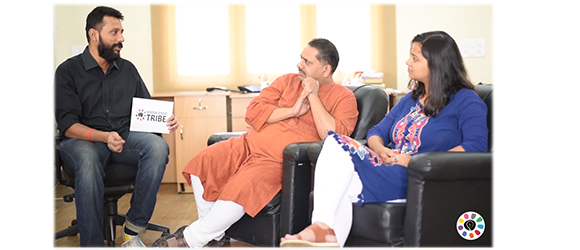
Vishnu: But, she doesn’t help them. She does not help them.
Rashmi: Teachers do not do that, no, they don’t do that (laughs), but yes, she’s… she’s so into quizzing, and its more than just quizzing for them, with these kids who come from small towns like Rajahmundry. I am very sure, and I can say this, Tata Crucible is a huge achievement for them. It’s a platform where they get a lot of exposure, it’s not just knowledge, not just a factor of knowledge, but there is confidence. They are sitting in front of a crowd that they would probably otherwise, not be exposed to. They are confident to talk to anybody now, and its confidence and knowledge that goes together that helps them better, and it goes down in their resume too.
Vishnu: And they almost made it to the national finals…
Pickbrain: Yeah, they almost did. In fact, to add to what she said, it was probably a very humbling experience in a modern era where you tend to think that teachers are not like how they used to be, you know, some years ago, and so on and so forth. The teacher broke down seeing the students win! She’s literally crying… there’s tears out of joy! Sheer joy that her college won a Tata Crucible. That is the kind of commitment, we salute teachers like that.
Vishnu: Just before we began this season, we had Palak and Sudeep with us, the reigning champions, in the studio and they spoke about probably being in some sort of vacuum, some sort of a zone, during both the zonal and the national finals itself. I mean, we… I asked Palak how many teams were around him, and he remembered, I think he remembered about four of them. He didn’t remember the rest, he was just so focussed on the quiz. Now guys, you’ve been doing this for what, fifteen years now, how, what’s it like being the quizmaster when everyone is facing so much pressure?
Pickbrain: Pressure is something teams put on themselves. I personally believe that’s not necessarily the right way to play. In fact, more number of teams that lose out are the teams which come there with the intention of winning. The teams which come there to enjoy and celebrate knowledge as Tatas would call it, actually end up winning more often, which is why you see a lot of newer champions emerging.
Rashmi: I’ve seen both. There are many kids who have come to enjoy and won like that. But, I have seen many quizzers be in that ‘zone’ as well. Pickbrain is quite witty and humorous on stage and I have seen quizzers who are with him and they are laughing and all of that, but I’ve also seen quizzers who are… they don’t look left and right, they only listen to what he says when it comes to the question and they just look at the screen.
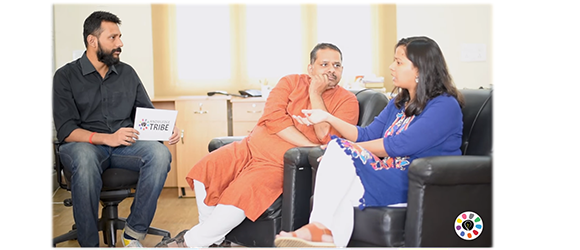
Vishnu: But, it’s a little scary though, isn’t it?
Rashmi:Of course! (laughs)
Pickbrain: No, it is. In fact, someone had commented on social media, it said, ‘Pickbrain why don’t you ask your teams to smile. It looks like they are all attending a funeral’. So, it is not a wrong observation, half of them I think take life a little too seriously. I think it starts with our schooling, you’re always conditioned and prepared to win. So, somewhere I think as a country we need to change that.
Vishnu: So, this is a landmark here for both the Tatas as well as the Crucible, fifteen years of the Tata Crucible. How has it changed from when you started all the way back in 2003?
Pickbrain: Oh, completely, I mean. What started as an eight-city event of about 800 teams or so taking part has today become 38 cities, add Singapore and Dubai, 40 cities; 8000 plus teams, that’s 16,000-odd people, 1.5 million people following in on social media. I think what started as a quiz, has become a movement. It’s a knowledge movement across the country, it has transcended geographic borders. It’s also become, perhaps, like, I’ve said it in past, the Wimbledon of quizzing in India, as far as campuses are concerned. Hats off to the Tatas for thinking it through and building this property, its truly overwhelming to be associated.
Vishnu: Rashmi, you’ve hosted a lot of the Crucible prelims and wild cards this year, what was that like? There’s a set there, lights come on and suddenly there are 800 teams sitting over there. What’s that like?
Rashmi: Umm…It’s a lot of fun actually, it’s a lot of fun. I learnt a lot myself. Yes, I’ve… I think I draw from my teaching experience when it comes to this but…I think I give too many clues though, maybe that comes from my teaching days but it’s a lot of fun. Its very nice to see everyone so very interested and so deeply into something of knowledge value. The colleges that come in, I think there were some unlikely colleges that came in this time, who have not taken part in Crucible before. And, they got exposed to a platform like this and the expression on their faces was overwhelming for me to see because they don’t get such opportunities at all and they were happy about what they were doing, and there was this sense of ’I can do this’, you know. That really gave me a lot of… made me feel, okay, thank god I’m doing something worthwhile with my life. After all, knowledge knows no boundaries.
Vishnu: Well, that’s actually a beautiful line, knowledge knows no boundaries, Crucible is a beautiful place. Now, I think we have covered pretty much everything we wanted to speak about, let’s look at your travel schedules. In all this, I refuse to believe that…
Pickbrain: You seem very curious about travel.
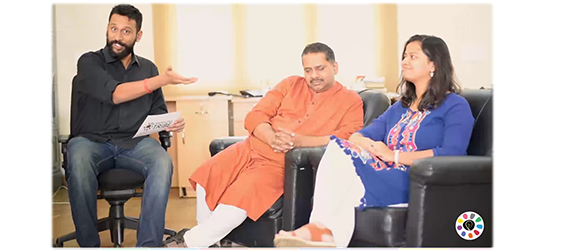
Vishnu: I like travelling, but out of all of this, I find it really hard to believe that there’s not been one missed flight, one train that ran late, anything like that?
Rashmi: We plan well. We plan well…
Pickbrain: We did have…we did have a few jitters this time. We do have it every year because the schedule is tight. One city to another every day, and you know this year I think we did 22 cities in 26 days, yeah.
We did have one incident, this was Varanasi and the whole crew, everyone was on the same train; we were going to Patna. We woke up at early hours, I think, was at 6 or 6:15 in the morning. All just got into the train and crashed. Then at about 8:30 or so I think, hunger woke us up and we woke up and realised we are still in Varanasi! So,¬¬ I asked what happened, the train is still here, and then realised that there was some track related issue and the train left at nine and we barely reached about in time for the quiz!
Vishnu: Let’s not jinx that then. We wish you good luck and cannot wait to see you until the next season!
The national finals of the Tata Crucible for Campuses 2018, was held on Saturday, April 14, 2018, at the Taj President in Mumbai.
National Winners
PES University, Bengaluru
International Winners
NIT, Kurukshetra


